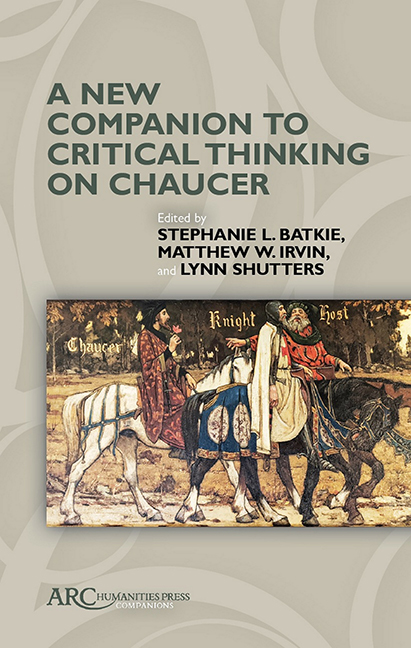Book contents
Blak
Published online by Cambridge University Press: 21 October 2021
Summary
Miller's Tale
AN ESSAY ON “Black Chaucer” might readily call to mind the question of how Chaucer has been deployed and appropriated by African-American, Afro-Caribbean, and other black writers. It might bring to mind work of the sort done by Reginald Wilburn in his magisterial study of African-American appropriations of Milton or the brilliant essay on Chaucer in the Caribbean by Michelle. R. Warren. More such work must be done, and it will be significantly aided by studies that aim to investigate Chaucer's appeal to black Anglophone writers. Indeed, this study argues that Chaucer might appeal to such writers not only for the same reasons that allmedieval literature might appeal to black writers— namely, that writers in the Anglophone African diaspora have just as much right as any other Anglophone writers to claim the entirety of the English literary canon—but also that Chaucer's work lays open to view the value of blackness as an epistemic tool, an apparatus that enables knowledge accumulation, in the medieval English literary and cultural contexts.
Black has multiple valences in Chaucer: it is the colour of natural objects, it adorns people, and it constitutes settings. The common denominator is that blackness, the condition of being black, often connotes loss. In Chaucer's Franklin's Tale, the heroine Dorigen fixates on the “rokkes blake” off the coast of Brittany while she pines for her husband who is away on chivalric endeavours. In the Book of the Duchess, a knight adorned all in black, a metaphor for Chaucer's real-life patron and political player John of Gaunt, mourns for his lost beloved, who is herself a metaphor for John's late wife Blanche. In the Knight's Tale, suffering Theban noble widows beg Theseus to avenge them and their husbands on the vicious Creon. The widows are clad all in black, and they reveal their plight when Theseus asks them why they dress this way. Blackness connotes the threat of violent death in the Franklin's Tale, and it connotes the aftermath of death in the Book of the Duchess and the Knight's Tale. There is strong evidence for the association of blackness with mourning—whether the context is love, war, or the inevitability of natural death.
- Type
- Chapter
- Information
- A New Companion to Critical Thinking on Chaucer , pp. 217 - 228Publisher: Amsterdam University PressPrint publication year: 2021



